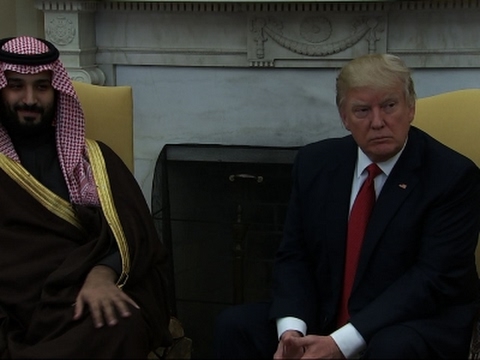By Daniel Martin Varisco | MENA Tidningen | – –
The old saying goes “With friends like this, who needs enemies.” This is especially apparent in the visit of Saudi Prince Mohammed Bin Salman to meet newly elected American President Donald Trump in mid-March. Coming two days before the latest Trump era anti-Muslim ban was to go into effect, Prince Bin Salman said after the meeting that he supported the ban and did not think it was against Muslims. It was obviously not against Saudi Muslims, although one wonders why given that most of the attackers in the 9/11 bombing were from Saudi Arabia. But it is abundantly clear to the vast majority of Muslims worldwide, especially in the United States, that this ban does indeed target Muslims. The U.S. federal courts agree, issuing yet another stay on this callously recrafted executive order.
The problem with Trump is that he has a track record of Islamophobic statements, including his campaign pledge to ban all Muslims from coming into the United States. Given his chosen advisors, the fact that lawyers for hire can come up with a supposedly constitution-friendly ban on visitors and immigrants makes for great political theater but is as illegal as it is reprehensible. The increase in America of hate crimes against Muslims and Jews (anti-semitism is not just about Jews) is clearly correlated with the racist-bating rhetoric that Trump inspires. So far Trump’s ‘lie as often and as outrageous as you can’ twitterkrieg is not winning over new supporters. Even Fox News, perhaps his most loyal media outlet, rates his popularity only at 44%. Consider that the same poll found that Senator Bernie Sanders has a 61% favorable rating and Planned Parenthood (which Trump wants to end) has 57% favorable. The ‘let loose in the candy store’ Senate Republican leader Mitch McConnell has a 20% favorable rating and Representative Paul Ryan is only at 37%. The ‘Obamacare’ law, which the Republicans are bent on destroying, has a 50% approval.
But back to the Saudi Prince. I suppose it should come as no surprise that Prince Bin Salman, who is only 31 years old and has no military training, should be the impetus for the Saudi-led coalition campaign that has created a horrific humanitarian crisis in Yemen with no end in sight, as well as causing damage to the southern area of Najran that the Saudi regime has ignored in their quest to make Riyadh their own Oil-rich Disneyland. If he cares so little for the lives of Yemeni men, women and children, why should he not embrace the same kind of unethical concern as Trump and his political acolytes. According to Prince Bin Salman, “President Trump expressed his deep respect for the religion of Islam, considering it one of the divine religions that came with great human principles kidnapped by radical groups.” Really? That is probably news to his advisors Steve Bannon and Stephen Miller, or the advice he received from Islamophobe Frank Gaffney. I suspect that Rev. Franklin Graham, a strong supporter of Trump, would not characterize Islam as a divine religion. Graham does not see the travel ban as a “biblical issue,’ although his brand of Evangelicals often consider Islam to be part of the biblical apocalyptic scenario for the prophesied Battle of Armageddon.
The history of the American friendship with Saudi Arabia, dating back to 1945 when President Roosevelt promised to defend Ibn Saud’s realm in return for a stake in the oil, is based on mutual interest that has been economic and political, but with no concern whatsoever for ethics. Saudi Arabia has one of the worst human rights records in the world, with frequent beheadings, prejudicial treatment of their Shi’a population and major restrictions on women. The spread of their intolerant Wahhabi doctrine is part of the genealogy of al-Qaeda and ISIS. Yet, it seems as long as they are willing to spend billions of dollars buying American military hardware, they remain a friend. Even the fact that the United States no longer needs Saudi oil does not seem to be a factor in assessing the continuing value of the cozy relationship. The 18th century French philosopher Jean-Jacques Rousseau said, “Those people who treat politics and morality separately will never understand either of them.” The world has little changed since then. If the current regime in Saudi Arabia remains a friend of the United States, the morality of both countries is short changed.
Daniel Martin Varisco – Anthropologist and historian with 40 years of experience researching and working in Yemen. Current President of the American Institute for Yemeni Studies, Research Professor of Social Sciences at Qatar University and expert advisor to MENA Tidningen.
Reprinted from MENA Tidningen with author’s permission.
——
Related video added by Juan Cole:




 © 2025 All Rights Reserved
© 2025 All Rights Reserved